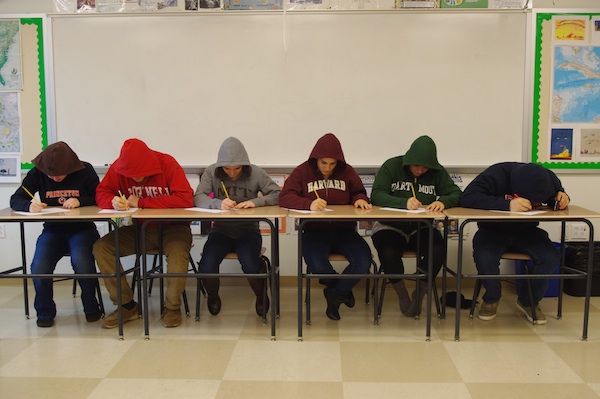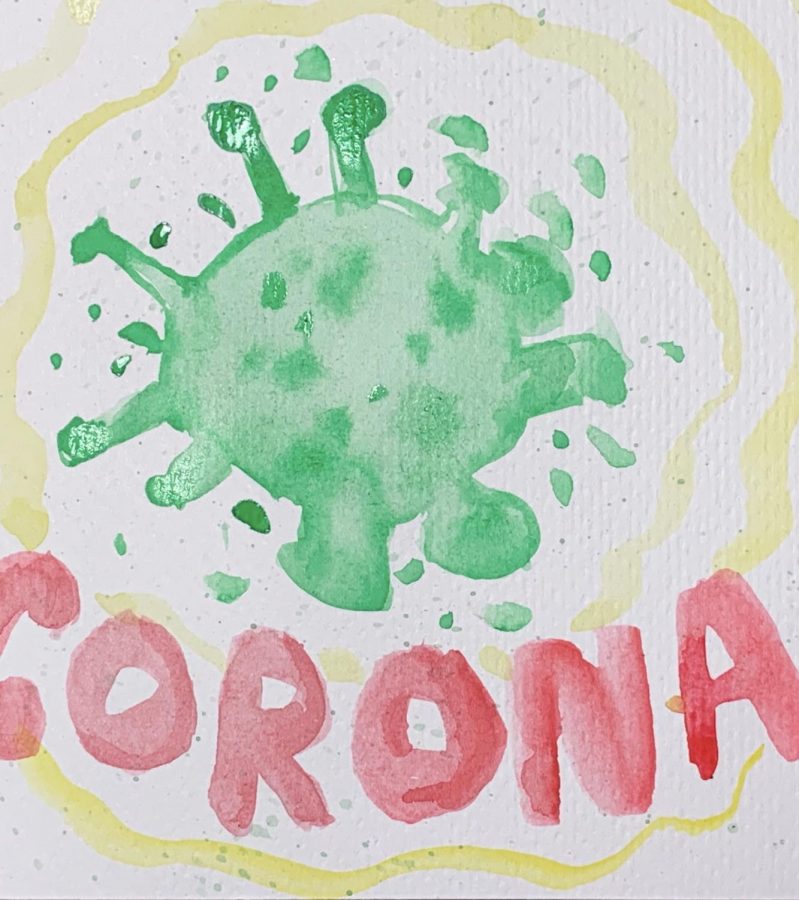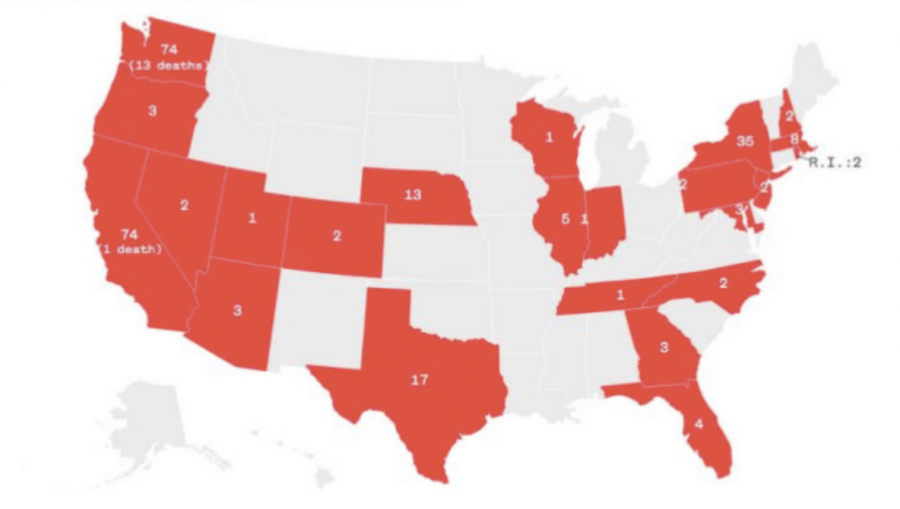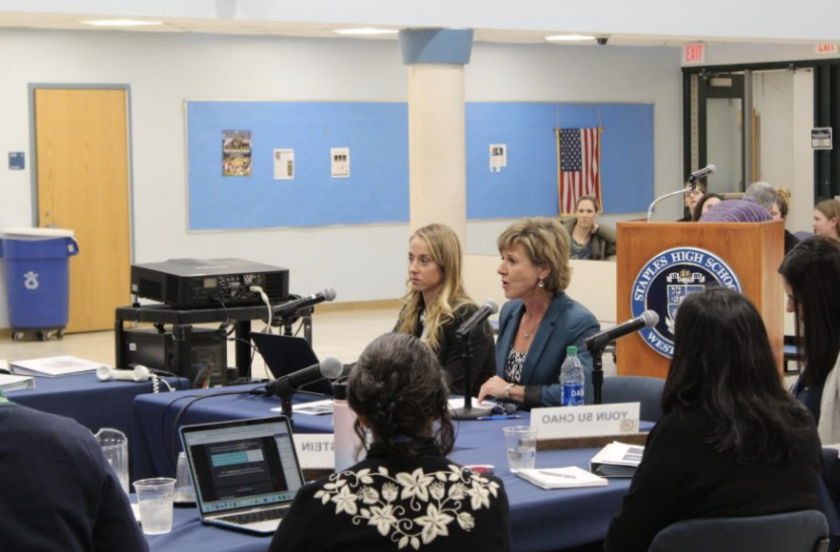It can present itself in a series of sneezes, a pair of knocks upon a desk, or the clicking of pens in a peculiarly ordered fashion.
Cheating.
While Staples has gone high-tech, symbolized by classrooms decked out with Smartboards and computers equipped with Windows 7, the technology used to cheat on assignments may be surprisingly rustic.
According to a recent study conducted by the University of Michigan’s Institute for Social Research, 48% of Staples sophomores and 50% of juniors self-reported cheating on exams. Recent interviews with more than a dozen Staples students revealed that the methods of academic cheating at Staples are as varied as the students who cheat and their justifications as well.
One Staples student, who requested anonymity says that she used a system that incorporated knocking on her desk to cheat during exams.
“I would work with one or a few people sitting in front of or behind me, and we tapped on our desks to signify answers on multiple-choice tests. One knock meant “A,” two knocks represented choice “B,” and so on. There were substitutes, such as passing notes on scrap paper or flashing hand signals, but they were all very basic methods,” she said.
The student said that precise counts of sneezes and coughs could be used in place of desk knocks in order to cheat on multiple-choice tests.
In fact, students said that certain cheating methods are used more often in particular subjects.
“There are forms of cheating which are used almost exclusively on science and math tests, such as putting formulas into a calculator, that are very easy to execute,” the second anonymous student said. “But really, it doesn’t matter what I use, as long as it’s time effective, and I don’t get caught.”
The two students, and others interviewed, detailed the tactics that they and others employ to cheat, including copying notes, coughing, and openly discussing answers with other students during a test.
Yet the second anonymous student holds his own rationale for cheating. Namely, he believes that it is the only way to conquer his daily workload.
“In looking at the times that I cheated on assignments and tests, I’m being sincere when I tell you that it was all done out of necessity. I had to make the choice to either study for an exam at three in the morning, or to have the assurance that I could function in the morning and ace my test,” he said.
As the second student holds the belief of cheating for practical necessity, the first anonymous student offers his theory on how cheating can evolve within an individual.
“When I cheated on a test for the first time, I felt like a pretty horrible person. But it paid off in the sense that I did well on that test,” the student said. “I continued to cheat because it took a lot of pressure off, and it was easier to cheat the second time than the first.”
“Do I feel good about it? No. But would I do it over again? Absolutely.”
Some students and teachers question whether course leveling has an impact on cheating rates and styles. Some argued that overall cheating rates increase in classes at the Honors or AP levels. This runs contrary to conventional thinking that students cheat merely to avoid failing.
“I guarantee you that the students in the upper-level classes are the ones that cheat hardest and most often,” the first anonymous student said.
In reference to the class in which she employed the “knock on the desk” method, the first anonymous student said that cheating was pervasive.
“I only know of two students in that class who weren’t in on cheating during tests,” the student said.
Four other students, who also requested anonymity have corroborated the claims in regards to the pervasive cheating within the class.
In contrast, the second anonymous student, who is enrolled in several AP classes, believes that the difference between students who cheat in standard-level and advanced classes is not the frequency of cheating, but rather the types of assignments that theycheat on.
He and other students interviewed, believe that students in AP and Honors level classes are more predisposed towards cheating on a multitude of smaller assignments, including homework and science labs, in addition to larger tests.
However, Christine Radler, an English teacher at Staples who teaches both A- level and AP classes, argues that cheating rates do not depend on class levels but rather upon an individual’s commitment to integrity.
“It’s merely human nature to try to game the system. The issue is that some people act on those feelings, and others don’t. I catch about two people per year in various forms of cheating, but it doesn’t happen more often in any particular class,” Radler said.
Social studies teacher Eric Mongirdas also considers the first anonymous student’s argument to be invalid.
“I think that cheating is a universal problem. Many of my students in my standard courses take AP courses as well, so its not limited to one subject or level,” Mongirdas said.
Some teachers, including Mongirdas, make an effort to deter cheating through the construction of their assignments.
“Much of what we do in the Social Studies department asks students to apply real-world solutions. So, some of the answers we ask the students to come up with haven’t been created yet—which inherently makes it very difficult for them to cheat,” Mongirdas said. Mongirdas, for example, assigns a project to his two sections of A.P. United States History that involves tracing a particular element of American culture through the decades of the Revolutionary War, Industrial Revolution, and World War II.
However students cheat, and in what classes, a persisting problem is how to adjudicate once they are caught.
“I can’t pursue people who I just suspect of cheating on exams, they have to be caught in the act. When that happens, it’s generally dealt with quickly. But that type of blatant cheating on tests is relatively rare in comparison to incidences of cheating through plagiarism or cheating on homework: plagiarized writing is also really easy to detect,” Radler said.
Students said that they might make a decision on whether or not to cheat based on the nature of the teacher administering the class.
“There are some teachers who are very keen towards instances of cheating, and I wouldn’t want to put myself in the position of likely being caught. But there are others who are completely oblivious to their surroundings, and student who intend to cheat will take full advantage of them,” the student said.
Older teachers, and teachers who spend time on a computer during an exam period, were perceived by some students to be less aware of their surroundings, and thus less capable of detecting cheating.
Yet not all Staples students cheat, clearly, and a good number have strong feelings about the practice.
One Staples student, who also requested anonymity reported students for cheating on tests in both standard and honors level classes. This is because, in contrast to the other two anonymous students, she believes that cheating is less about personal gain and more about creating an unjust learning environment for other students.
“I think that cheating creates stratification in the classroom,” the student said. “People who are cheating undermine the people who do their work honestly because they add to the pressures of an already cutthroat environment.”
And there may, paradoxically, be ways in which the learning environment itself is already twisted to promote cheating.
“As long as the pressures of getting into college and competing for the highest G.P.A. exist, cheating will run rampant. It could be worse; I guarantee you that if Staples instituted class rank, it all will turn into a complete s*** show,” the second anonymous student said.
In looking at the cumulative effects of academic cheating, Radler takes a view that extends beyond high school, and into American society.
“It’s inevitable that some of the people who cheat, especially the ones who don’t get caught, will succeed. Look at business, look at politics—it’s all indicative of a culture that promotes cheating to get ahead. If there’s going to be any chance of solving the problem at Staples, it’s going to stem from a larger societal shift,” Radler said.




















































